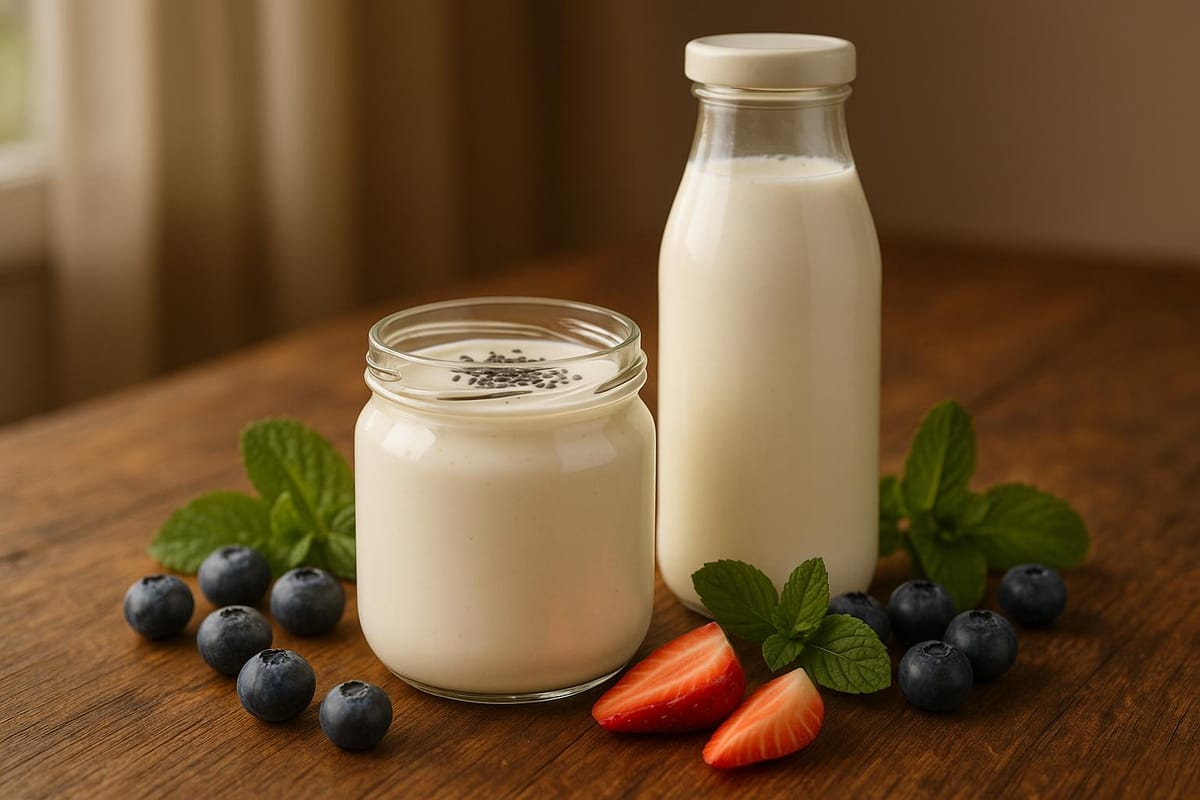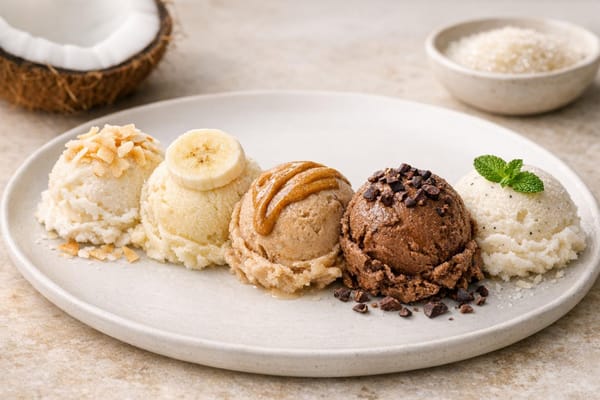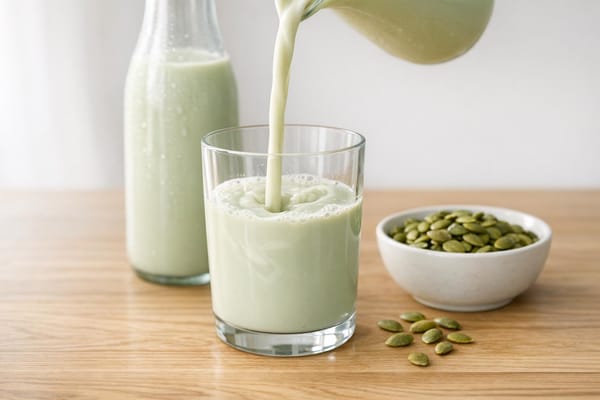Fermented Dairy and Gut Inflammation: What Studies Show
Explore how fermented dairy products like yogurt and kefir can reduce gut inflammation and promote digestive health through probiotics and bioactive compounds.

- Fermented dairy products like yogurt, kefir, and buttermilk are easier to digest and may reduce gut inflammation. They contain probiotics, bioactive peptides, and postbiotics, which support gut health and immune balance.
- Proven benefits include strengthening the gut barrier, lowering inflammatory markers, and improving microbiota diversity. For example, Lactobacillus and Bifidobacterium strains in fermented dairy help reduce pro-inflammatory markers like IL-6 and boost anti-inflammatory IL-10.
- Research highlights: A 2024 review of 26 studies found that fermented dairy can ease digestive discomfort and improve gut microbiome balance in people with gastrointestinal issues like IBS.
- Practical tips: Incorporate 2–3 servings daily of natural yogurt, kefir, or aged cheese. For those with lactose intolerance, options like Greek yogurt or lactase enzyme supplements can help.
Brad Bolling, Whey-fortified fermented milk for inhibiting intestinal inflammation
How Fermented Dairy Affects Gut Health
Fermented dairy products, like yogurt and kefir, have a reputation for supporting digestion and reducing gut inflammation. This is thanks to several biological processes that occur during fermentation, making these foods a powerful ally for your digestive system.
The Key Players in Fermented Dairy
The gut health benefits of fermented dairy come from probiotics, bioactive peptides, and antimicrobial compounds - all of which work together to support a healthy microbiome.
- Probiotics: These are live, beneficial bacteria that survive the fermentation process. Strains like Lactobacillus and Bifidobacterium are commonly found in concentrations close to one billion per gram. These bacteria actively engage with the gut lining and immune cells. For instance, research shows that Lactobacillus reuteri ATCC PTA 6475 can suppress inflammation by blocking tumor necrosis factor (TNF)-α, while L. casei DG lowers pro-inflammatory markers like IL-8, IL-1α, and IL-6, while boosting the anti-inflammatory cytokine IL-10.
- Bioactive Peptides: These are produced during fermentation and are known for their antimicrobial and immune-modulating properties. They help maintain gut stability by inhibiting harmful bacteria and viruses.
- Postbiotics: These are beneficial byproducts created by probiotic bacteria. Even after the bacteria are no longer active, postbiotics continue to promote essential physiological functions.
These compounds not only support the gut microbiome but also play a role in strengthening the gut barrier.
Strengthening the Gut Barrier
The gut lining acts as a gatekeeper, allowing nutrients to pass through while keeping harmful substances out. When this barrier is weakened - sometimes referred to as "leaky gut" - inflammation can follow. Fermented dairy helps reinforce this vital defense system.
The gut barrier includes mucus, antimicrobial peptides, and tight junction proteins that hold intestinal cells together. Probiotics from fermented dairy enhance mucus production and protect tight junctions by reducing harmful substances like lipopolysaccharides (LPS) from crossing the gut wall.
Another way fermented dairy protects the gut is through immune system modulation. Since about 70% of immune cells reside in the gut, probiotics play a key role in balancing immune responses. For example, a mix of L. rhamnosus, BB. lactis, and BB. longum has been shown to increase anti-inflammatory IL-10 levels while lowering pro-inflammatory IL-1 and IL-6. Similarly, L. reuteri LMG P-27481 has been found to boost IL-10 secretion when interacting with human immune cells. Probiotics also influence dendritic cells, which help steer the immune system toward either tolerance or inflammation.
Easier Digestion for Those With Lactose Intolerance
Fermentation naturally reduces the lactose content in dairy, making it easier to digest for many people. However, if you still experience discomfort, lactase enzyme supplements can help. For example, products like Milktab’s lactase pills, which include a triple-enzyme formula, can improve dairy digestion and allow you to enjoy the gut-friendly benefits of fermented dairy without worry.
What Recent Studies Show
Recent research highlights how fermented dairy products can play a role in reducing gut inflammation. These findings align with earlier discussions about their biological mechanisms. Here's a closer look at how these effects are reflected in inflammation markers, immune responses, and changes in gut bacteria.
Lower Inflammation Markers
In a 17-week randomized trial with 36 participants, researchers observed that increasing fermented food consumption from an average of 0.4 servings per day to 6.3 servings daily significantly lowered inflammatory markers and boosted microbiota diversity. Similarly, a 2021 dietary intervention demonstrated that eating more fermented foods not only enhanced microbiome diversity but also improved several serum markers linked to inflammation. This suggests that fermented dairy could help combat chronic, low-grade inflammation often seen in industrialized societies.
Probiotic Strains and Their Effects
Certain probiotic strains found in fermented dairy, such as Lactobacillus reuteri and L. casei, have been shown to impact immune responses positively. These bacteria can increase IL-10 levels, reduce IL-8 secretion, and modulate pro-inflammatory mediators. They also enhance TLR2 activity and help balance immune responses by shifting them from Th2 to Th1 profiles, potentially reducing allergic reactions. Other beneficial strains from Lactobacillus, Bacillus, and Bifidobacterium genera, as well as Saccharomyces, activate dendritic cells to release IL-10 and IL-12, fine-tuning immune regulation.
Changes in Gut Bacteria
Consuming fermented dairy products leads to noticeable shifts in gut bacteria that are linked to lower inflammation. For instance, individuals who eat natural yogurt tend to have higher levels of Akkermansia, a bacterium associated with better gut health, while those consuming sweetened yogurt show reduced levels of Bacteroides. Cheese consumption has been tied to increased production of short-chain fatty acids like acetate, propionate, and butyrate, which play a role in controlling inflammation.
| Fermented Dairy Product | Impact on Gut Bacteria |
|---|---|
| Natural Yogurt | Higher levels of Akkermansia |
| Sweetened Yogurt | Lower levels of Bacteroides |
| Cheese | Increased acetate, propionate, and butyrate |
| Regular Yogurt | Reduced enterotoxigenic Bacteroides fragilis after 8 weeks |
One study found that an 8-week yogurt intervention significantly reduced the presence of enterotoxigenic Bacteroides fragilis, a strain linked to gut inflammation. Another study noted that fermented milk containing Lactobacillus and Bifidobacterium led to gender-specific increases in these beneficial bacteria. However, the gut microbiome in healthy individuals is often resilient to short-term dietary changes, making consistent consumption of fermented dairy crucial for sustaining these benefits.
The next section will delve into the ongoing discussions surrounding different types of fermented dairy products.
Conflicting Research and Debates
Although many studies highlight the potential benefits of fermented dairy for gut health, there’s still plenty of debate within the scientific community. Differences in study designs, participant demographics, and the challenge of accurately measuring inflammation add layers of complexity to this topic. These ongoing discussions help us better understand how fermented dairy interacts with gut inflammation. Two key areas of debate are the impact of fat content and the role of added sweeteners.
Full-Fat vs. Low-Fat Fermented Dairy
For years, traditional dietary guidelines have favored low-fat dairy products. But newer research is starting to challenge these long-held beliefs. A 2017 review of 52 clinical studies found that dairy generally has anti-inflammatory properties, except in individuals with cow’s milk allergies. Interestingly, when comparing full-fat and low-fat options, 75% of the inflammatory markers studied were higher in people who consumed low-fat milk. Short-term diets that included low-fat dairy also didn’t show improved biomarker profiles compared to full-fat dairy.
"Yogurt is associated with decreased inflammation, decreased insulin resistance and it may prevent type 2 diabetes."
- Frank Hu, MD, PhD, professor of epidemiology and nutrition at the Harvard T. H. Chan School of Public Health
A 2023 review involving over 1,400 participants found minimal evidence linking higher dairy intake - including full-fat dairy - to increased blood pressure or cholesterol levels. Similarly, a French study revealed that full-fat dairy consumption wasn’t associated with a higher risk of heart disease or stroke. In fact, fermented full-fat cheese and yogurt were linked to a reduced risk of stroke.
Some studies even suggest that full-fat dairy might have a subtle anti-inflammatory effect rather than contributing to inflammation.
"Short-term consumption of a combination of low- and high-fat dairy products as part of a healthy diet has no adverse effects on inflammation."
- Labonté et al.
Additionally, yogurts made from sheep and goat milk appear to have stronger anti-inflammatory effects compared to those made from cow’s milk. While fat content plays a role in these outcomes, the presence of added sweeteners introduces another layer of complexity.
Sweetened Fermented Dairy Products
The inclusion of sugars and artificial sweeteners in fermented dairy products is another hotly debated topic. While natural fermented dairy often shows promise in reducing inflammation, the addition of sweeteners may counteract these benefits.
Between 1999 and 2000, artificial sweetener consumption skyrocketed in the United States - rising by about 200% among children and adolescents and 54% among adults. Research indicates that steviol glycosides resulted in the lowest levels of LPS synthesis genes and the highest IL-10 levels, which are associated with anti-inflammatory effects. In contrast, mice fed sucrose or sucralose showed the highest levels of LPS synthesis genes, suggesting a more inflammatory response.
"Eating dairy products like yogurt with active, live bacteria cultures may help strengthen gut health to reduce inflammation."
- Carolyn Williams, Ph.D., RD
Another study by Suez and colleagues found that saccharin consumption disrupted gut bacteria and caused glucose intolerance in some healthy individuals. When gut bacteria from these individuals were transferred to germ-free mice, similar disruptions in glucose metabolism occurred, further emphasizing the role of the gut microbiome.
Dietary patterns also reveal some interesting trends: people who consume natural yogurt tend to eat more dairy, fruits, and sauces, while those who opt for sweetened yogurt are more likely to consume higher amounts of sugars, sauces, and non-alcoholic beverages.
These varied findings highlight the complexity of studying fermented dairy and its relationship with inflammation. Factors like individual responses, different study methodologies, and the intricate composition of fermented foods - including fats, sugars, and byproducts of fermentation - all contribute to the diverse outcomes observed.
"It's difficult to predict the total effect of food based on a single nutrient, especially when you consider that diet as a whole contributes a net effect to overall health."
- Kyla M. Lara-Breitinger, M.D., M.S., Cardiologist at Mayo Clinic
How to Add Fermented Dairy to Your Diet
If you're looking to enjoy the perks of fermented dairy, here’s how to make it a regular part of your meals. From picking the right products to managing portion sizes and accommodating digestion, these tips can help you get started.
Choosing the Right Products
To make the most of fermented dairy, focus on products rich in live cultures. For example, yogurt with live cultures has been shown to have anti-inflammatory properties. A 2021 study revealed that consuming just 0.28 cup-equivalents of yogurt daily could lower levels of interleukin-6, a key marker of inflammation.
Kefir is another excellent choice. An 8-ounce serving packs about 16% of your daily vitamin D needs and almost 50% of your daily vitamin A, along with other nutrients and bioactive compounds.
Cultured cottage cheese is a good option, too. It contains probiotics that support gut health. Research on postmenopausal women found that higher dairy consumption, including cottage cheese, was linked to reduced levels of inflammatory markers like C-reactive protein and interleukin-6. For added benefits, choose low-sodium versions.
Aged cheeses can also supply probiotics, provided they’re minimally processed to retain beneficial bacteria. However, keep portions small, as these cheeses are often higher in calories and sodium.
Lastly, cultured buttermilk is a great option for those with lactose sensitivity. It contains digestion-friendly bacteria and has been tied to reduced cardiovascular risks in long-term studies.
Managing Lactose Intolerance with Enzymes
Fermented dairy can also work for people with lactose intolerance. During fermentation, some lactic acid bacteria produce lactase, an enzyme that helps break down lactose. Studies involving 55 patients showed that yogurt enriched with L. acidophilus and Bifidobacterium species significantly reduced lactose intolerance symptoms. Plus, a single cup of yogurt provides around 40% of your daily calcium and phosphorus needs, along with important vitamins like B2 and B12.
For those with severe lactose intolerance, enzyme supplements can make a difference. Products like milktab combine lactase, protease, and lipase to help digest lactose, proteins, and fats in dairy products. Alternatively, Greek yogurt is a lactose-free option that still offers many of the benefits of fermented dairy.
How Much and How Often
To maximize the benefits of fermented dairy, aim for 2–3 servings per day. Research shows this can help lower risks for conditions like high blood pressure, type 2 diabetes, and colorectal cancer, aligning with global dietary recommendations and the Mediterranean diet pyramid.
The benefits increase with higher consumption. A meta-analysis found that for every 20-gram daily increase in cheese, sour milk, or yogurt intake, there was a 2% reduction in cardiovascular disease and all-cause mortality. Eating yogurt regularly (five or more servings per week) has been linked to a 16% lower risk of high blood pressure.
In the Italian EPIC study, involving 45,241 participants, consuming about 85–98 grams of yogurt daily was associated with a 35% reduced risk of colorectal cancer. Additionally, each serving of 200 grams of yogurt or 20 grams of cheese contributed to a 10–15% lower risk of hip fractures.
A practical strategy? Stick to one or two servings of fermented dairy daily. For instance, enjoy a cup of yogurt at breakfast and a small portion of aged cheese later in the day. This approach allows you to reap the benefits while staying within recommended dairy intake guidelines.
Conclusion: What the Research Tells Us
The research paints a clear picture: fermented dairy products are a valuable addition to a diet aimed at improving gut health and managing inflammation. Studies, such as one from University College Dublin, highlight how these foods can positively impact gastrointestinal health and help address digestive issues.
Across nine studies, researchers observed an increase in beneficial bacteria like Lactobacillus and Bifidobacterium, while six studies noted better diversity in gut bacteria. Additionally, fourteen clinical trials reported improvements in gut comfort and more regular bowel movements when fermented dairy was included in the diet.
The anti-inflammatory benefits are just as compelling. For example, yogurt consumers had lower C-reactive protein levels (2.1 ± 4.6 mg/L compared to 5.5 ± 10.5 mg/L), signaling reduced inflammation. They also showed lower oxidative stress markers and higher levels of Akkermansia, a gut-friendly bacterium.
"Fermented dairy foods can positively influence aspects of gastrointestinal health and the gut microbiome in inflammatory bowel disease and functional gastrointestinal disorders [...] Increasing fermented dairy consumption is a practical dietary strategy that may aid the management of gastrointestinal complications." - Ní Chonnacháin C, et al.
This is especially noteworthy since nearly 40% of people deal with functional gastrointestinal disorders like IBS. Research also shows that fermented dairy can ease symptoms such as bloating, flatulence, and diarrhea. Even those with lactose intolerance can benefit, thanks to enriched yogurt options and enzyme supplements.
The bottom line? Incorporating fermented dairy - whether it’s yogurt, kefir, or aged cheese - into your diet is a simple, science-backed way to support gut health and reduce inflammation. These findings make a strong case for making fermented dairy a regular part of your routine.
FAQs
How can fermented dairy products help with IBS and gut health?
Fermented dairy products, such as yogurt and kefir, can be a helpful choice for people dealing with Irritable Bowel Syndrome (IBS) or other digestive issues. These foods are rich in probiotics, the friendly bacteria that play a key role in maintaining a healthy gut microbiome. Studies suggest that probiotics from fermented dairy can ease IBS symptoms like bloating and abdominal discomfort by balancing gut bacteria and encouraging the production of anti-inflammatory compounds, such as short-chain fatty acids.
Another advantage of fermented dairy is its ability to improve lactose digestion, which makes it a suitable option for those who are lactose intolerant. By supporting gut health and calming inflammation, these foods can be a useful addition to your diet if you're managing IBS or other digestive challenges.
Can consuming fermented dairy products negatively affect gut health?
While fermented dairy products are often praised for their potential to support gut health, they’re not a one-size-fits-all solution. If you have lactose intolerance or a dairy allergy, consuming these products could lead to unpleasant symptoms like bloating, gas, diarrhea, or stomach discomfort. This is typically due to residual lactose or proteins like casein, which can sometimes trigger inflammation in sensitive individuals.
If you’re unsure how your body will react, it’s a good idea to start with small portions and observe any changes. For those with lactose intolerance, using lactase supplements can make enjoying dairy a bit easier and more comfortable.
What’s the difference between natural and sweetened fermented dairy products when it comes to gut health and inflammation?
Natural fermented dairy products, like yogurt and kefir, are well-regarded for their ability to promote gut health. They encourage the growth of beneficial bacteria such as Lactobacillus and Bifidobacterium, which play a key role in improving microbial diversity, reducing inflammation, and supporting immune function. Studies consistently underline their role in maintaining a healthier gut.
However, sweetened versions of these fermented products might not deliver the same advantages. The added sugars can interfere with the benefits of fermentation, potentially increasing inflammation and disrupting the balance of gut bacteria. To prioritize gut health, it’s a smart choice to stick with natural, unsweetened options whenever you can.



